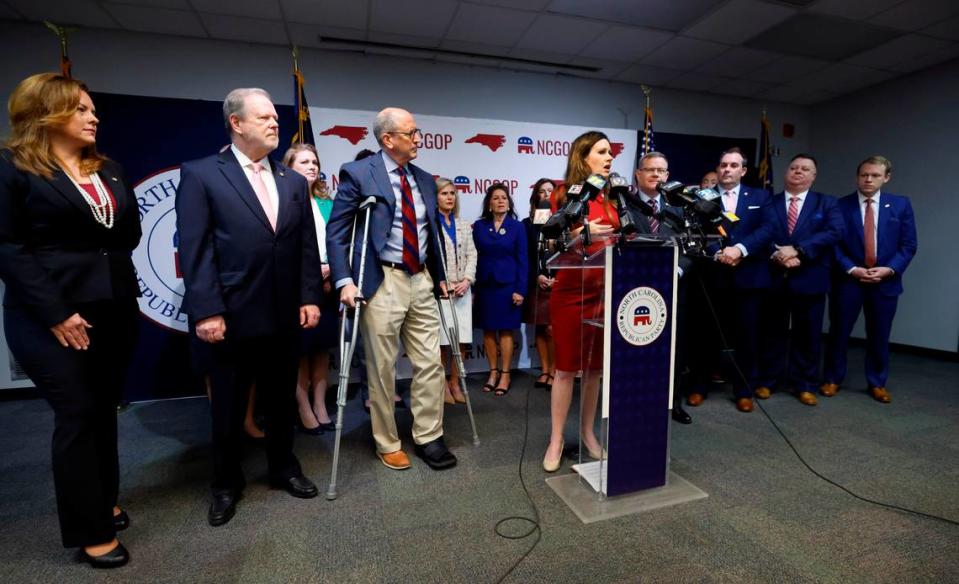GOP say when they knew of Cotham switch — and why everyone should’ve seen it coming
- Oops!Something went wrong.Please try again later.
- Oops!Something went wrong.Please try again later.
Rep. Jason Saine, a prominent Lincolnton lawmaker, was packing up his things and getting ready to leave the Legislative Building. It was Monday — an administrative day for the General Assembly — but big votes were coming later in the week. As the House conference chair and a senior chair of the Appropriations committee, Saine had vested interest in the chamber’s budget proposal, which legislators would debate in the next few days.
Before the slog set in, Saine planned to meet a friend from outside politics for a casual dinner.
“I was on my way out the door,” he told McClatchy, “and John Bell grabbed me and said, ‘Hey, can you meet with me and the speaker over at the GOP headquarters?’”
The speaker was Tim Moore: a Kings Mountain Republican and the most powerful politician in North Carolina’s House of Representatives. Bell, a Goldsboro Republican and the House majority leader, carried similar clout.
“I literally stood up my friend who was already at the restaurant,” Saine said.

The meeting was to substantiate rumors Saine first heard the Friday before. Rep. Tricia Cotham, a tenured Democratic legislator who’d rejoined the General Assembly in January after a six-year absence, was waffling over what to do with her party affiliation. She was close to crossing the aisle.
“But it wasn’t definite,” Saine said. “It was, ‘Hey, be ready… Tricia is not happy.’”
Two days later, on Wednesday, April 5, Cotham publicly confirmed the speculation. Flanked by Saine, Bell, Moore and other Republican big shots at Raleigh’s GOP headquarters, Cotham announced her move to the Republican Party.
Her defection ignited a national firestorm. Cotham had given Republicans the final seat they needed to claim a supermajority in both chambers. Democrats across the country denounced her “betrayal.” In response to Cotham’s switch, the White House told McClatchy that “bedrock American freedoms are at stake….”
To some of her colleagues, though, Cotham’s move reflected months of mounting vexation.
“It was not a surprise to anyone in the General Assembly,” said Rep. Jon Hardister, the Republican House whip. “It’s probably not a surprise to any (North Carolina General Assembly) political observer, given that she’s voted with the majority somewhat frequently and certainly is an independent spirit and all that. So I don’t think with all the attacks being directed her way anyone was surprised.”
Cotham’s frustrations with Democrats
Since Cotham’s return to state elected office in January, Hardister, Saine and others in the Republican caucus had been hearing of her waxing frustration. Soon after the session started, Saine said, Cotham lamented her station in the party.
“You know the people in my caucus, they’re mean,” she’d told him.

Legislative Democrats in 2023 were different from what Cotham remembered. When she joined the General Assembly as an appointee in 2007, Democrats held majority power. She was heralded as one of the chamber’s youngest members and its youngest woman, The News & Observer reported.
After Democrats lost their legislative control in 2010, Cotham won respect for working across party lines to promote Democratic priorities.
Then she left the legislature for an unsuccessful congressional campaign, and the party evolved without her.
“Politics has changed on every level since she left the legislature in 2016,” said Jonathan Coby, a longtime campaign adviser to Cotham who resigned from her staff last week. “Coalitions have shifted and both party bases are more vocal and engaged. Skipping crucial votes or voting against your district doesn’t go unnoticed. Somehow she didn’t expect public accountability.”
Cotham didn’t respond to The N&O’s request for comments on this story, but in press conferences and TV segments since her party switch, she has repeatedly cited mistreatment from fellow Democrats as the impetus behind her decision. Democrats have pushed back, saying they tried to include Cotham in caucus activity but she was distant and unresponsive.
House Minority Leader Robert Reives told The N&O Friday that he and Cotham communicated often and he felt like they had a constructive relationship.
“Other members, though, felt she frequently ignored their continued efforts to reach out to her and include her in any way that they tried in caucus activities both legislative and social,” Reives said. “They were welcoming and accommodating to Rep. Cotham as a member of our caucus.”
Reives said Cotham, like every other House Democrat, was invited by email to come to caucus meetings. He said he encourages all members of the caucus to participate in the meetings because it’s where they can share differing opinions and debate policies and priorities among themselves.
“She only bothered to come one time,” Reives said.
“Generally, all I was ever told was she was too busy to attend.”
Internal party tensions escalated last month when Cotham skipped a vote to override Gov. Roy Cooper’s veto of a bill repealing the state’s pistol permit requirement. Her absence helped Republicans rebuff Cooper’s attempt.
Cotham has said she missed the vote for a medical appointment. Democrats suspect Republicans orchestrated her truancy.
“During her break from elected office, North Carolinians have twice elected a Democratic governor as a check on a far-right Republican legislature that has embraced bizarre culture war issues,” Coby said. “The Governor’s veto power was the only thing standing in the way of their total power. But Cotham apparently didn’t see Democratic voters in her own district or anywhere in North Carolina as legitimate.”
Campaign donations from PACs
Democrats’ vitriol in the wake of Republicans’ successful veto override crystallized Cotham’s decision to switch parties, Saine said. But her opponents and some political pundits suspect Cotham’s plans predated last year’s election. They say Cotham’s campaign finances corroborate their take.
Many of the political action committees, or PACs, that funded Cotham’s campaign overwhelmingly favored Republicans. Of the Democrats to whom they donated, Cotham earned the most. The next highest Democratic earner was House Democratic leader Robert Reives, who received little more than half of Cotham’s contributions.
But it’s not unprecedented for right-leaning donors to support some Democratic candidates. Saine said it’s common for PACs to ask whom they should fund on both sides of the aisle. Cotham, a moderate Democrat in a blue district who faced more liberal competitors in her primary, was a natural choice.
“I do this on a regular basis when PACs talk to me or people talk to me to get money,” Saine said. “... If you’re one of those groups, and you need to spread money to Democrats to cover your bases, she’s not a bad choice. But I also say the same thing about Robert Reives.”
Saine also told PACs which candidates he hoped they wouldn’t support.
“I.e. not Deb Butler, not Julie von Haefen, not, you know, Marcia Morey and the far left,” he said.
Still, Saine and other Republicans don’t agree with theories that Cotham planned to switch parties when she ran as a Democrat, nor that Republicans coordinated her campaign expecting she’d join their caucus.
“Now if there’s some deep, dark secret plan, I’m the conference leader and no one told the conference leader,” Saine said. “I don’t think it’s quite as nefarious as they’d like to believe.”
Coby, Cotham’s former staffer, agrees.
“The idea that this was some sort of yearlong conspiracy gives far too much credit to the Republicans and their new caucus member,” he said.
But Coby understands the rampant rumors.
“...When you refuse to face your voters and answer tough questions, people will draw their own conclusions, and she’s given people very little to work with,” he said. “She’s made it clear she can’t be trusted and will no longer control the narrative on this or anything else. That’s on her.”
‘No long-term plan’ for Cotham’s defection
On Friday morning, Moore, who said he is traveling in Eastern Europe without enough cellphone reception to make a call, texted McClatchy to provide some context.
Moore said he learned about her defection “only a few days before she announced it.”
“There was no long-term plan of any kind,” Moore said. “I take her at her word. I always knew she was centrist and would potentially vote with us on bills but also knew she had to still stick with her party on votes so I was very sensitive to that.”
Moore said COVID-19 took a toll on Cotham’s health and Democrats’ treatment of Cotham led to her change in parties, he believes.
“I have been careful not to try and encourage her to do anything so when she changed parties that is something she decided on her own,” Moore said. “I simply told her we would warmly welcome her to the GOP if she wanted to join.”
He added that seeing what she went through because of her switch and how riled up it made some people put everything in perspective.
Coby thinks Cotham’s party switch betrays a capricious personality, not a complex conspiracy.
“If we’ve learned anything in the past week, it’s that ego and admiration are Cotham’s driving forces,” he said. “I would sadly not be surprised to see her vote in direct opposition to the platform she ran on to get elected, even on issues she used to champion like abortion rights or protecting the LGBTQ community. Her actions have shown she is not a person with principles or a value system.”
Republicans will count on Cotham’s vote to help advance the final hot-button issues of this year’s legislative session and through the end of Cooper’s term. With a supermajority secured, Republicans have nearly free rein to pursue the party’s legislative priorities, unchecked by their Democratic counterparts.
Saine is comfortable claiming the win, and blames Democrats for failing to accommodate Cotham’s wishes.
“She’s been talking about (her issues with the party) for months,” he said. “If they’re too shortsighted, and quite frankly, too damn dumb to realize that that would happen — when we only needed one vote — I mean, what planet do you live on? That to me is the biggest rub of all.”

